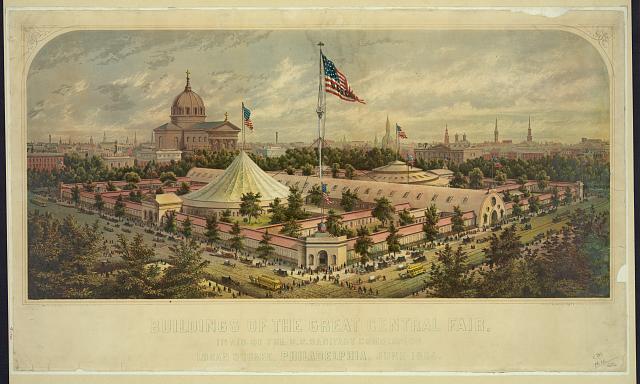One of our Facebook friends recently asked us about Lew’s speech given in Philadelphia after Lincoln’s famous “Hung in Black” speech. As a result, we adapted our research and response for this post.
The 1864 Republican National Convention
On June 7 and 8, 1864, the Republican National Convention met in Baltimore and nominated Abraham Lincoln to a second term in the White House. Earlier that year, Lincoln appointed Lew Wallace as Commander of the 8th Army Corps in Baltimore. Lew had already successfully supported an election in Maryland that assured that the state would remain in the Union. Holding the Convention in Baltimore furthered the Union cause.
On June 16, the President traveled from Washington to Philadelphia for the Philadelphia Fair, a benefit to the Sanitary Commission. The Sanitary Commission was a private relief agency established by federal legislation to support sick and wounded Union soldiers. Local dignitaries and people lining Chestnut Street greeted the President with great applause.
The Sanitary Commission

![Mathew Brady [Public domain], via Wikimedia Commons](https://www.ben-hur.com/wp-content/uploads/2013/06/Abraham_Lincoln_Brady_CDV_O-86_January_8_1864-1.jpg)
Late in the day, Lincoln returned to his hotel for the formal dinner. The Honorable Edward Everett (featured speaker at the Gettysburg Dedication in 1863), former Governor Cannon of Delaware, the Mayor of Philadelphia, several local dignitaries, and General Lew Wallace joined him at table. The evening began with a toast to the health of the President by Thomas Webster, to which Lincoln responded.
Lincoln’s “Hung In Black” Speech
In acknowledging the toast, he noted the work of the Sanitary Commission with comments that came to be known as his “Hung in Black” speech. Lincoln said:
I suppose that this toast is intended to open the way for me to say something. War at the best is terrible, and this of ours, in its magnitude and duration, is one of the most terrible the world has ever known. It has deranged business totally in many places, and perhaps in all. It has destroyed property, destroyed life, and ruined homes. It has produced a national debt and a degree of taxation unprecedented in the history of this country. It has caused mourning among us until the Heavens may almost be said to be hung in black….
After noting the important work of the Sanitary and Christian Commissions, Lincoln went on to say, “When is this war to end? I do not wish to name a day when it will end, lest the end should not come at the given time. We accepted this war, and did not begin it. We accepted it for an object, and when that object is accomplished the war will end; and I hope to God it will never end until that object is accomplished.”
Lincoln v. McClellan
Lincoln spoke these powerful words at a difficult time. Although the Republicans had re-nominated Lincoln, his re-election in the fall was by no means assured. The North still reeled from the devastating Battle of the Wilderness in May. After the Wilderness followed Cold Harbor; more than 9,000 men died in one hour. In the six weeks before this speech, General Grant’s army had seen 52,000 casualties; people as close to the President as Mrs. Lincoln were demanding Grant’s removal. Lincoln stood firm: “I can’t spare him. He fights!” As losses mounted and morale in the North teetered, Lincoln also faced the popular George McClellan. McClellan, the Democrat Party’s candidate for president, urged a negotiated settlement with the South to end the war.
Other Speeches
After Lincoln concluded his comments, the others toasted General Wallace. Lew made a brief speech intended to support Lincoln’s stance. He declared that General Grant was the right man in the right place. In addition, Lew said his mind was free from all doubt that Grant would capture the rebel capital and capture Lee’s forces.
After Wallace’s comments, the group toasted Edward Everett. In contrast to his long speech at Gettysburg, Everett kept his comments brief. He said, “After such an address from the man who has borne upon his shoulder the cares and burdens of this struggle, what can I acceptably say?”
After a few additional comments and presentations, the evening wound down. Lincoln made a more visits around town that night but declined invitations to speak. The next day, Lincoln and his party, which included Wallace, returned to the White House. There, additional battles and losses would occupy the President’s days. One of these would be the Battle of Monocacy Junction just three weeks later, where Lew Wallace delayed Jubal Early as the Confederate General advanced on Washington, D.C.